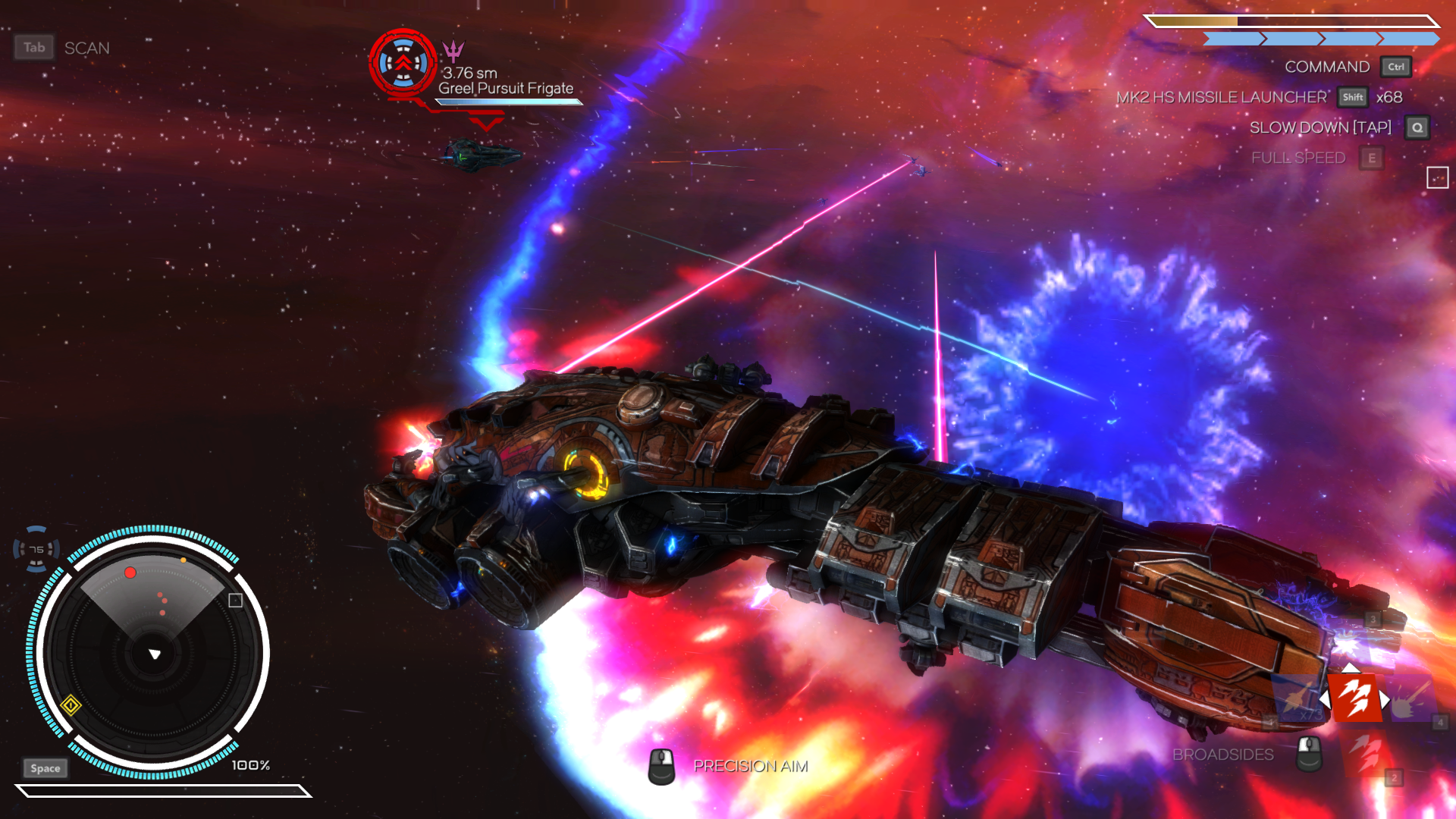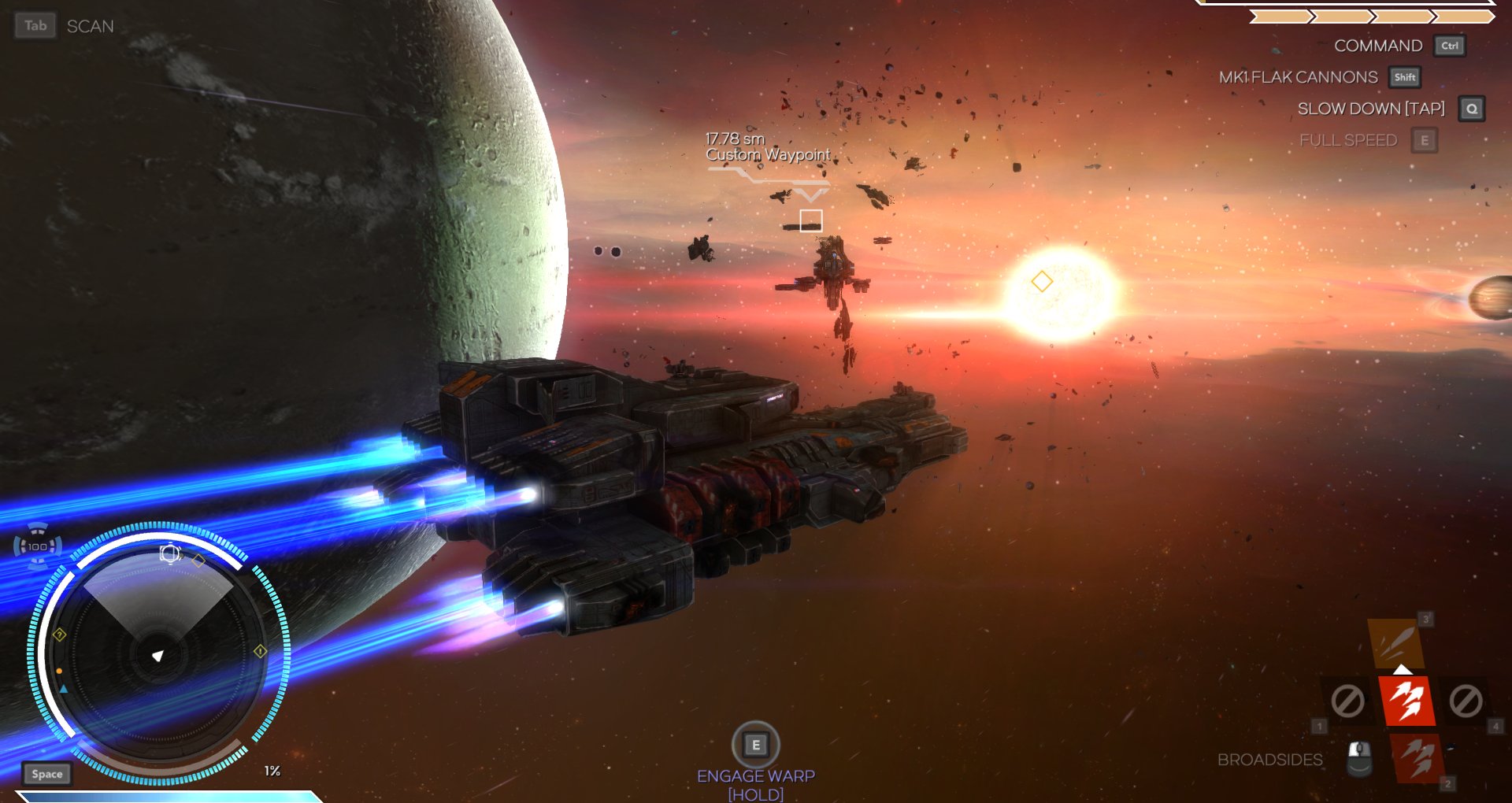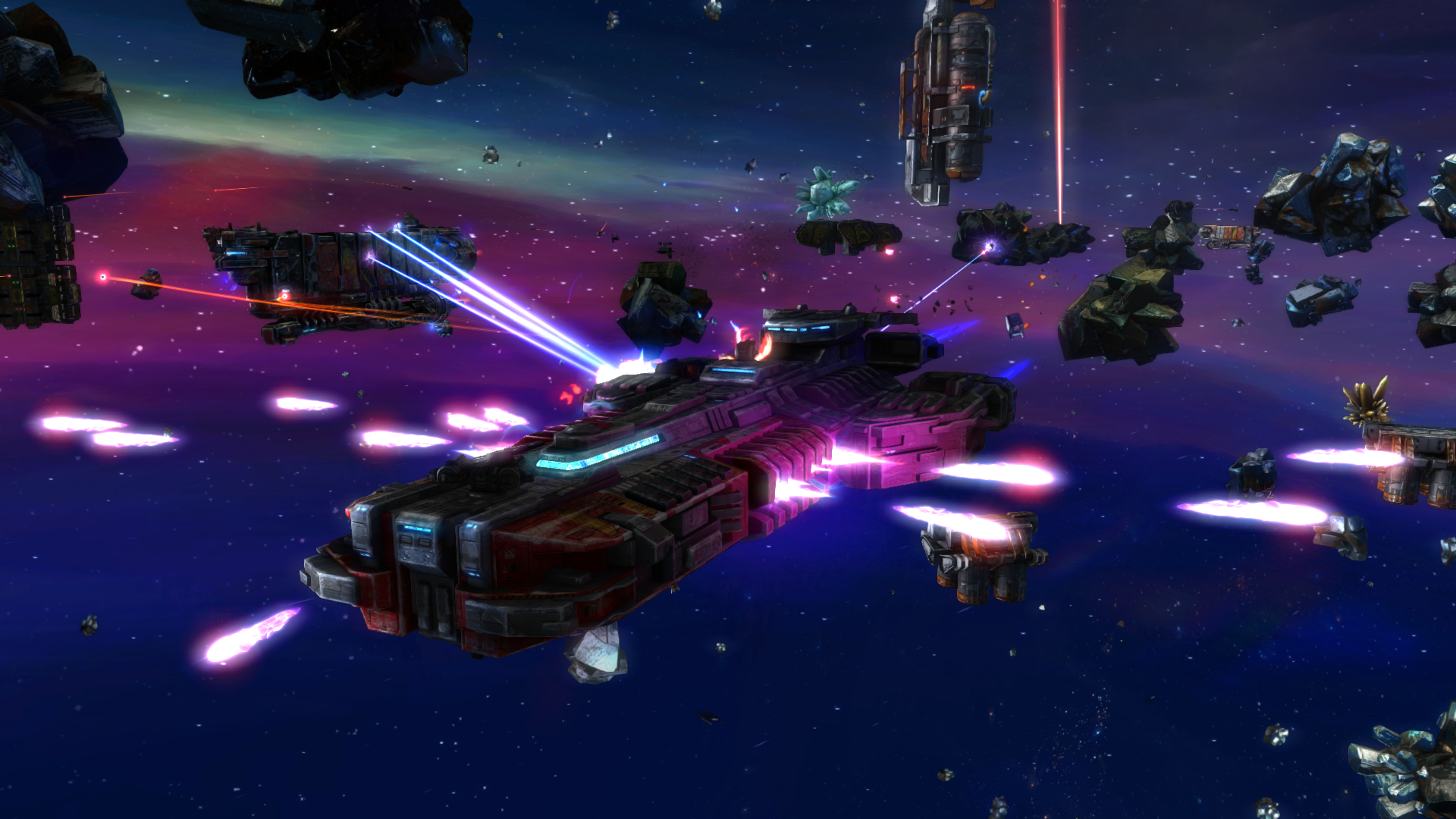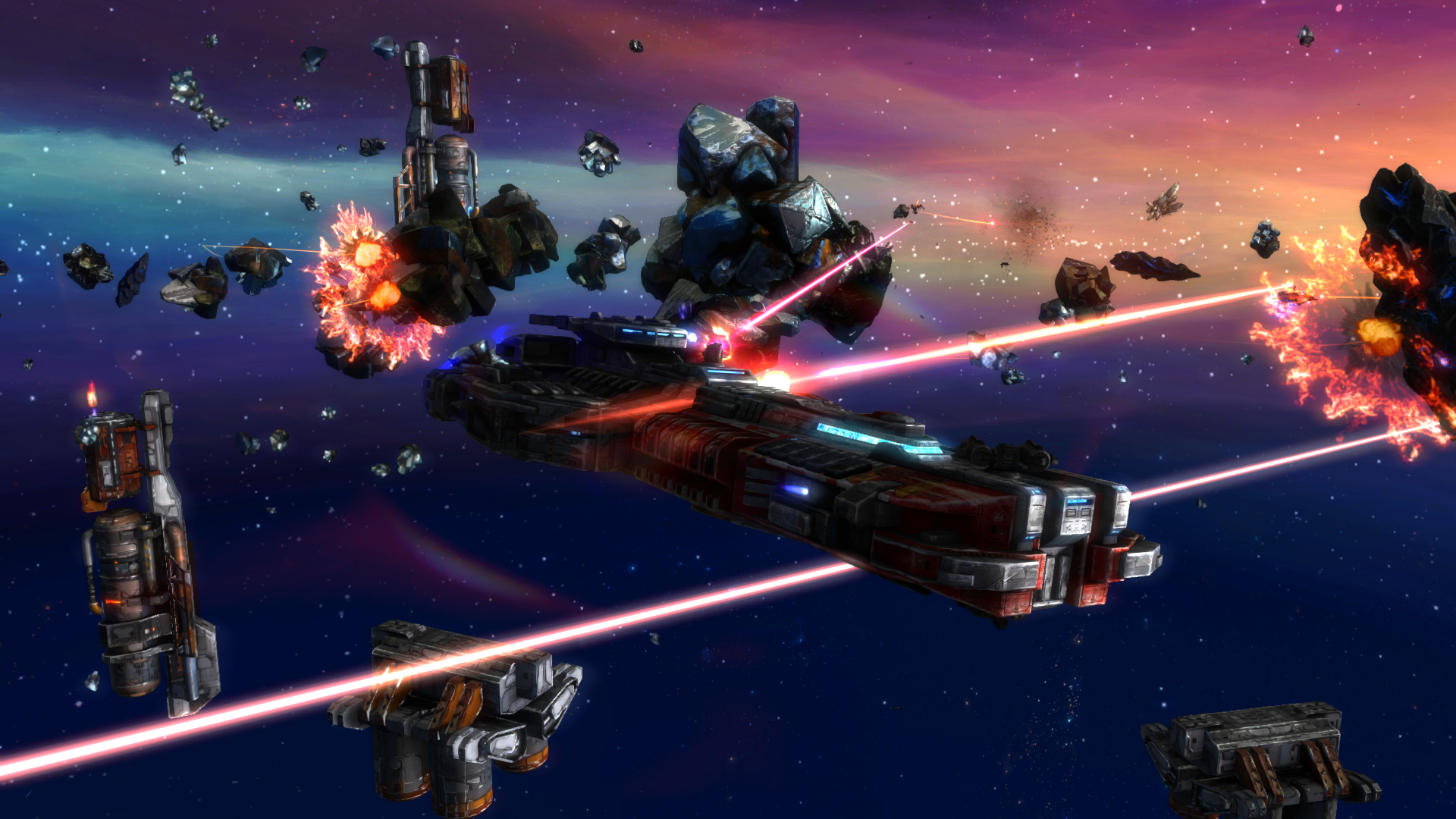Our Verdict
Rebel Galaxys combat can be a lot of fun, but there's little depth and a lot of repetition.
PC Gamer's got your back
What is it? A space combat action combat RPG
Expect to pay: $20/£15
Developer: Double Damage Games
Publisher: Double Damage Games
Reviewed on: Intel i7 x980 3.33 GHz, 9 GB RAM, Nvidia GeForce GTX 960
Multiplayer: No
Link: Official Site
My first impressions of Rebel Galaxy weren't great. In my starter ship, a slow and clunky behemoth with crummy boosters unable to fire for more than a few seconds and default cannons that overheated almost as quickly, I wound up in a fight with an A.I. pirate whose ship was just as lousy as mine. We circled each other for long minutes, blasting away with our feeble weapons, neither of us able to finish the other off, until I quit the game in the middle of the fight out of boredom.
If I hadn't been reviewing it I may never have gone back, but I am, and I did, and I'm glad. Rebel Galaxy, a space action combat RPG created by two-person studio Double Damage Games, gets off to a slow start, and while it features a little too much repetition and grinding for my tastes, there are some exciting and chaotic space battles and an enjoyable, if not highly original, selection of activities. It also looks great: wonderfully designed ships, crackling weapon effects, beautiful lighting, and gorgeous explosions.

You're the captain of a massive tub of a ship, a real clunker, but through the standard video game space activities of mining, trading, and bounty hunting—or the outlaw versions, in which you kill miners and traders for their goods and battle government forces—your earned or ill-gotten spacebucks pave the way to better cannons, more powerful lasers, and improved engines, boosters, and shields. Earn enough and you can buy a better ship that will allow you to take more lucrative jobs and eventually buy an even better ship. There are story missions which add a little structure and purpose beyond simply earning money for upgrades, but the difficulty of these missions increases dramatically, meaning you'll still need to spend hours making bank and increasing your capabilities before you can move onto the next one. This is where the grind comes in: beyond mining, trading, and bounty hunting, there's really nothing else to do to earn a buck. It's not that these activities suck, there's just not much variety.
Whatever your chosen profession, you'll spend most of your time in combat because even if you're not looking for trouble, it'll find you. Your ship is constrained to a 2D plane through space, making Rebel Galaxy feel like a naval combat game: you only turn left and right, as if you're cruising across the surface of an ocean, so there's no rolling or banking or loop-the-loops. This keeps the movement part of the combat simple, but the cost is that it doesn't entirely feel like you're piloting a spacecraft, more like you're steering a cruise ship, albeit one bristling with weapons.

At times, the space battles can be tremendously fun, especially if you stumble into a massive engagement between rival factions. You can maneuver yourself alongside a capital ship and unleash broadside attacks, which can be aimed and charged by holding the mouse button for greater focus and damage. Broadsides aren't the most visually striking weapons, but hammering away at a massive, looming hull and watching it begin to disintegrate is satisfying enough. Incoming missiles can be blocked if you have deflectors, activated by tapping the spacebar, which is a fun reflex-based defense, though it takes your own weapons offline for a moment. Turrets will autofire but can also be manually aimed by switching weapons with the number keys, giving you a zoomed-in view that's useful for targeting any small, agile fighters looping around your ship (fighters aren't restrained to your 2D plane). Most other weapons are a bit slow and cumbersome, so turrets give you a lot of rapid-fire pew-pew space-blaster action, which is a fun diversion.
I became a huge fan of a special shield that let me do ramming damage—since I often accidentally crashed my lumbering spacebarge into things anyway, I figured I might as well make it work for me. I was also thrilled when I could finally afford to add auto-firing homing missiles and lasers, which let me concentrate on pounding capital ships while my A.I. weapons cleared the area of lesser craft. With all of your weapons going at once, with enemy fighters swooping and dodging and capital ships trailing debris before exploding in massive fireballs, big skirmishes can be exciting and chaotic.

More routine skirmishes, on the other hand, aren't always so great. On your long trips to and fro across the solar system, you'll commonly run into randomly generated pirates who pull you out of warp and attack you after delivering canned, repetitive threats. Often, it's just an annoyance: a few small fighters who have zero chance of actually defeating you and who have no bounties or decent cargo, meaning the encounter simply amounts to a waste of ordinance and time. One trip I took to reach a mission area was interrupted a total of six times by these random pipsqueaks. When I finally reached my mission I was promptly destroyed in combat, meaning the entire trip had to be repeated. That wasn't much fun.
Very rarely does losing a fight mean you've done something wrong tactically, it's more an issue of simply not having enough expensive space-stuff welded onto your ship. After your defeat, help text only ever suggests you buy stronger shields or better weapons to succeed, and that's really what Rebel Galaxy is about: not becoming more skilled at combat but simply owning a better ship with deadlier weapons. Earn more, buy more, win more, repeat.
It's a grind, yes, but an enjoyable one. Rebel Galaxy doesn't provide much tactical depth or bring anything original to the space genre, but it looks great, and its fun (mostly), arcadey space combat comes at a reasonable price.
Rebel Galaxys combat can be a lot of fun, but there's little depth and a lot of repetition.

Chris started playing PC games in the 1980s, started writing about them in the early 2000s, and (finally) started getting paid to write about them in the late 2000s. Following a few years as a regular freelancer, PC Gamer hired him in 2014, probably so he'd stop emailing them asking for more work. Chris has a love-hate relationship with survival games and an unhealthy fascination with the inner lives of NPCs. He's also a fan of offbeat simulation games, mods, and ignoring storylines in RPGs so he can make up his own.


